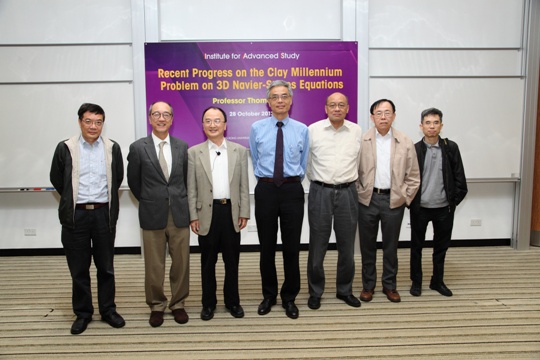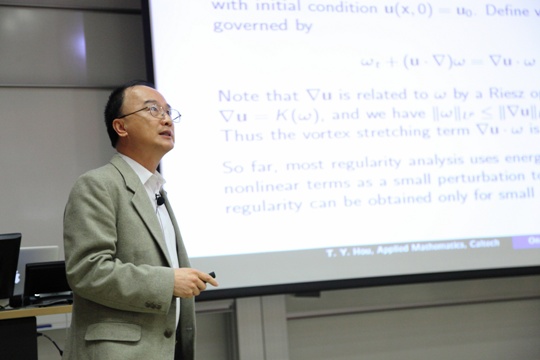Recent Progress on the Clay Millennium Problem on 3D Navier-Stokes Equations
Abstract
Whether the 3D incompressible Navier-Stokes equations can develop a finite time singularity from smooth initial data with finite energy is one of the seven Clay Millennium Problems. The speaker reviews some recent theoretical and computational studies of the 3D Euler equations which show that there is a subtle dynamic depletion of nonlinear vortex stretching due to local geometric regularity of vortex filaments. The study of his research group suggests that the convection term could have a nonlinear stabilizing effect for certain flow geometry. This is demonstrated through two reduced models of the 3D incompressible Navier-Stokes equations. The first model is a new exact 1D model for the axisymmetric Navier-Stokes equation along the symmetry axis. He shows that local flattening of the vortex structure and the effect of convection could lead to dynamic depletion of the vortex stretching term. In the second model, he derives a 3D model of the axisymmetric Navier-Stokes equation by removing the convection term from the reformulated Navier-Stokes equations. He shows both numerically and analytically that the solution of this 3D model develops a finite time singularity from smooth initial data with finite energy. Finally he presents a new class of solutions to the 3D Euler equations which could potentially lead to formation of finite time singularities.
About the speaker
Prof. Thomas Hou received his PhD from the University of California at Los Angeles (UCLA) in 1987. Upon graduating from UCLA, he joined the Courant Institute of Mathematical Sciences as a postdoc and then became a faculty member in 1989. He moved to the Applied Math Department at the California Institute of Technology in 1993, and is currently Charles Lee Powell Professor of Applied and Computational Mathematics.
Prof. Hou is one of the leading experts in vortex dynamics and multiscale problems. His research interests are centered around developing analytical tools and effective numerical methods for vortex dynamics, interfacial flows, and multiscale problems. He has received a number of honors and awards, including the Computational and Applied Sciences Award from the US Association for Computational Mechanics in 2005, the Morningside Gold Medal in Applied Mathematics in 2004, the Society for Industrial and Applied Mathematics (SIAM) Wilkinson Prize in Numerical Analysis and Scientific Computing in 2001, the Francois N. Frenkiel Award from the Division of Fluid Mechanics of the American Physical Society in 1998, the Feng Kang Prize in Scientific Computing in 1997, a Sloan fellow from 1990 to 1992. He was an invited plenary speaker at the International Congress of Industrial and Applied Mathematics in 2003, and an invited speaker of the International Congress of Mathematicians in 1998. He is a Fellow of the American Academy of Arts and Sciences and SIAM. He was also the founding editor-in-chief of the SIAM Journal Multiscale Modeling and Simulation from 2002 to 2007.









